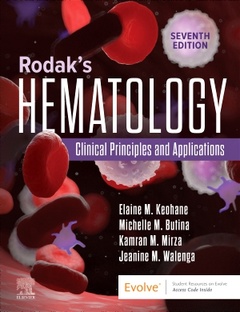Description
Rodak's Hematology (7th Ed.)
Clinical Principles and Applications
Coordinators: Keohane Elaine M., Montgomery Butina Michelle, Mirza Kamran M., Walenga Jeanine M.
Language: English
Subject for Rodak's Hematology:
Keywords
Keohane; Rodak; hematology; clinical lab; CLS; MLT; MLS; MLT; laboratory
928 p. · Hardback
Description
/li>Contents
/li>
Make sure you are thoroughly prepared to work in a clinical laboratory. Rodak's Hematology: Clinical Principles and Applications, 7th Edition uses hundreds of full-color photomicrographs to help you understand the essentials of hematology and hemostasis. This new edition details the parts and functions of the cell; shows how to accurately identify cells; covers normal hematopoiesis through diseases of erythroid, myeloid, lymphoid, and megakaryocytic origins; and simplifies hemostasis and thrombosis concepts and disorders. Easy to follow and understand, this book also covers key topics, including working in the hematology and hemostasis laboratory; complementary testing areas such as flow cytometry, cytogenetics, and molecular diagnostics; and laboratory testing of blood cells and body fluid cells.
- Content throughout the text reflects the latest information on hematology and hemostasis.
- Hematology and hemostasis instruments are described, compared, and contrasted.
- More than 700 full-color illustrations and photomicrographs make it easier to visualize hematology concepts and show what you'll encounter in the laboratory.
- Instructions for laboratory procedures include detailed figures and sources of errors.
- Case studies in each chapter provide opportunities to apply hematology concepts to real-life scenarios.
- Hematology and hemostasis reference intervals are listed on the inside front and back covers for quick reference.
- Bulleted chapter summaries make it easy for you to review important points.
- Learning objectives begin each chapter and indicate what you should achieve, with review questions appearing at the end.
- Appendices provide easy access to a list of key formulas, abbreviations, and a detailed glossary to complement learning.
- NEW! Chapter on Patient Safety in Hematology and Hemostasis.
- NEW! Section on hematology and hemostasis in transgender populations.
- UPDATED! White blood cell chapters are current with the 2022 World Health Organization (WHO) Classification of Haematolymphoid Tumours.
- NEW! Changes in laboratory results associated with COVID-19 and other viral infections.
- NEW! Content and figures on plasma transport, cell communication, and signal transduction.
- NEW!Coverage of CRISPR technology for treatment of hemoglobinopathies and thalassemia.
- UPDATED! Major revision of the Automated Blood Cell Analysis chapter.
1. An Overview of Clinical Laboratory Hematology
2. Patient Safety in Hematology and Hemostasis
3. Quality Assurance in Hematology and Hemostasis Testing
PART II: Blood Cell Production, Structure, and Function
4. Cell Structure and Function
5. Hematopoiesis
6. Erythrocyte Production and Destruction
7. Erythrocyte Metabolism and Membrane Structure and Function
8. Hemoglobin Metabolism
9. Iron Kinetics and Laboratory Assessment
10. Leukocyte Development, Kinetics, and Functions
11. Platelet Production, Structure, and Function
PART III: Laboratory Evaluation of Blood Cells
12. Manual, Semiautomated, and Point-of-Care Testing in Hematology
13. Automated Blood Cell Analysis
14. Examination of the Peripheral Blood Film and Correlation with the Complete Blood Count
15. Bone Marrow Examination
PART IV: Erythrocyte Disorders
16. Anemias: Red Blood Cell Morphology and Approach to Diagnosis
17. Disorders of Iron Kinetics and Heme Metabolism
18. Anemias Caused by Defects of DNA Metabolism
19. Bone Marrow Failure
20. Introduction to Increased Destruction of Erythrocytes
21. Intrinsic Defects Leading to Increased Erythrocyte Destruction
22. Extrinsic Defects Leading to Increased Erythrocyte Destruction - Nonimmune Causes
23. Extrinsic Defects Leading to Increased Erythrocyte Destruction - Immune Causes
24. Hemoglobinopathies (Structural Defects in Hemoglobin)
25. Thalassemias
PART V: Leukocyte Disorders
26. Nonmalignant Leukocyte Disorders
27. Introduction to Hematologic Neoplasms
28. Flow Cytometric Analysis in Hematologic Disorders
29. Molecular Diagnostics in Hematopathology
30. Cytogenetics
31. Acute Leukemias
32. Myeloproliferative Neoplasms
33. Myelodysplastic Neoplasms
34. Mature Lymphoid Neoplasms
PART VI: Hemostasis and Thrombosis
35. Normal Hemostasis
36. Hemorrhagic Disorders and Laboratory Assessment
37. Qualitative Disorders of Platelets and Vasculature
38. Quantitative Disorders of Platelets: Thrombocytopenia and Thrombocytosis
39. Thrombotic Disorders and Laboratory Assessment
40. Antithrombotic Therapies and Laboratory Assessment
41. Laboratory Evaluation of Hemostasis
42. Hemostasis and Coagulation Instrumentation
PART VII: Hematology and Hemostasis in Selected Populations
43. Hematology and Hemostasis in the Pediatric, Pregnant, Geriatric, and Transgender Populations
E1. Safety in the Hematology Laboratory
E2. Blood Specimen Collection
E3. Care and Use of the Microscope
E4. Body Fluid Analysis in the Hematology Laboratory
Appendix A: Abbreviations
Appendix B: List of Formulas
Appendix C: Answers
Appendix D: Glossary

